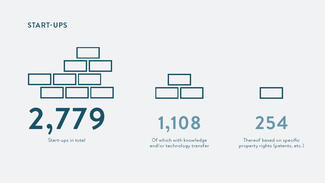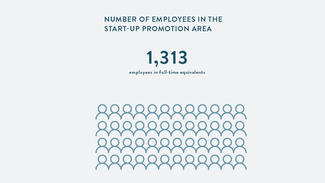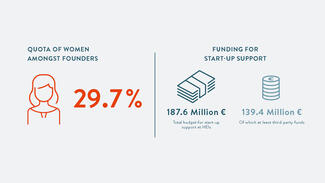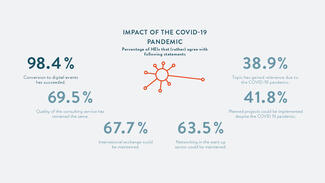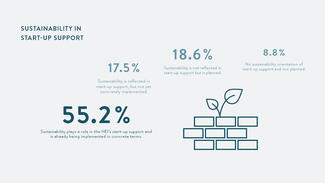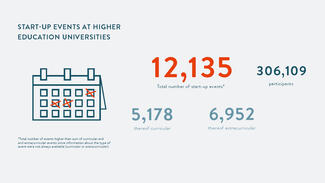
For the sixth time, the Gründungsradar compares the support of start-ups at German institutions of higher education (HEIs) in terms of quality and quantity. HEIs are key players regarding start-ups and innovation. This edition uses the same methodology and indicator set as the previous survey in 2020, thus allowing time comparisons between the surveys. The survey includes 196 higher education institutions which place significance on start-up support (184 in 2020). The Gründungsradar thus provides a valid data basis for start-up activity and start-up support at German HEIs.
- Top rankings in the Gründungsradar 2022
In the present survey, Munich University of Applied Sciences achieved the highest score in the category of large higher education institutions, Augsburg University of Applied Sciences in the category of medium-sized HEIs and HHL Leipzig Graduate School of Management in the category of small HEIs. While Augsburg University of Applied Sciences takes this top position for the first time, Munich University of Applied Sciences already achieved the top ranking in the 2012 and 2016 Gründungsradar surveys. The HHL Leipzig Graduate School of Management achieved the top spot in the category of small higher education institutions in all six previous surveys. However, the results are very close to each other, especially in the top field, and there are several HEIs with comparably good start-up support.
- Number of start-ups and start-up projects continues to develop positively
For 2021, the participating HEIs report a total of 2,779 start-ups. This is approximately 12.8 start-ups per 10,000 students. In the 2019 survey period, the figure was still about 10.5 start-ups per 10,000 students and 2,176 start-ups in total. 1,108 of the start-ups reported for 2021 were based on science and/or technology transfer (2019: 984), and 254 of the start-ups are based on intellectual property rights such as patents (2019: 186). In addition, the participating HEIs report 10,066 start-up projects in 2021. By comparison, 7,389 projects were reported for the 2019 survey period.
- Number of employees in start-up support increasing, but still with high dependence on third-party funding
There has been a huge increase in the number of people employed in the start-up support departments at higher education institutions. In total, the HEIs report 1,313 employees (full-time equivalents, as of December 31st, 2021) working in the field. This is almost a doubling within two years (2019: 684). There are thus approximately 1,655 students for every full-time employee. This sharp increase is primarily due to the “EXIST-Potentiale” federal funding programme and the significant expansion of start-up funding in North Rhine-Westphalia as part of the Excellence Start-up Center funding since 2019. However, employees in start-up support are still heavily dependent on third-party funding: At least 900 of the full-time equivalents are third-party funded positions. This dependence on third-party funding is repeatedly cited by higher education institutions as an obstacle to successful start-up support.
- Increase in the number of participants in events relevant to start-ups
For the academic year 2021 (summer semester 2021 and winter semester 2021/2022), the HEIs report that they have reached more than 300,000 participants in more than 12,000 start-up-relevant events. This is a significant increase from the academic year 2019, when approximately 200,000 participants were reached in just under 7,500 start-up-related events.
- Quota of women in start-up teams and in start-up projects at just under one-third
The quota of female founders among start-up members is still low. At the higher education institutions with specific information on the number of founding members
(N = 158), 5,217 founding members are counted, of which 1,552 are female, or just under 30 percent.
- Sustainability as a significant focus in start-up support
The topic of sustainability in start-up support is being surveyed for the first time as part of the Gründungsradar 2022. Around 73 percent of the HEIs state that the topic is reflected in the orientation of start-up support. At 55 percent of the HEIs, specific plans and projects in the area of sustainability in start-up support are already being implemented (N = 194). Around 72 percent of the 173 responding higher education institutions state that it is primarily the university management board that drives the issue of sustainability at their universities. For around 75 percent, it is the teaching staff, and for just under 68 percent, it is the students (multiple answers possible).
- Impact of the COVID-19 pandemic with barriers and opportunities for start-up funding
The impact of the COVID-19 pandemic on start-up support is described very differently by the HEIs. While the conversion of events to digital formats is being managed very well, more than half of the higher education institutions state that planned programs and projects in start-up support could not be realized due to the pandemic. About one-third of the universities also lament restrictions in international exchange and deterioration in the quality of consulting services provided by the start-up centres.
- Demands on policy makers
Higher education institutions repeatedly express the strong desire for the funding of start-up support to be made permanent. Likewise, the continuation and improvement of funding programmes as well as an associated reduction in bureaucracy are requested by the HEIs.
PDF download

